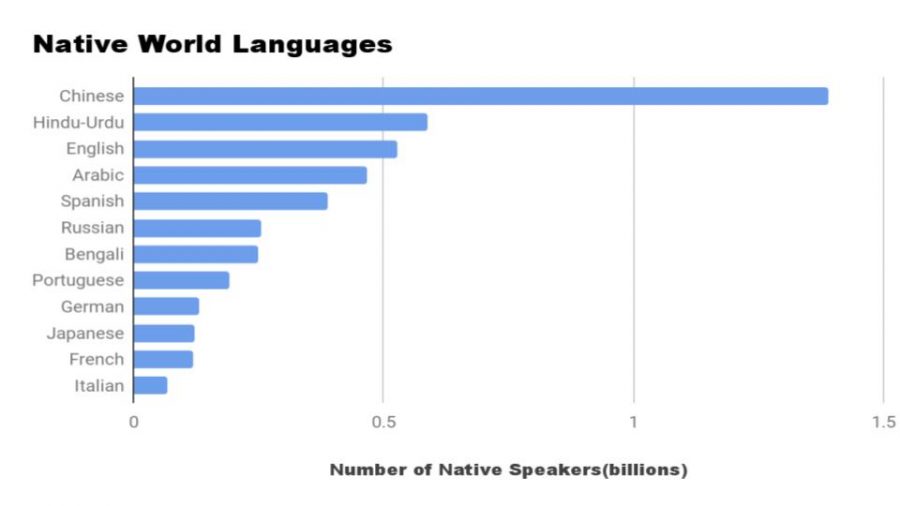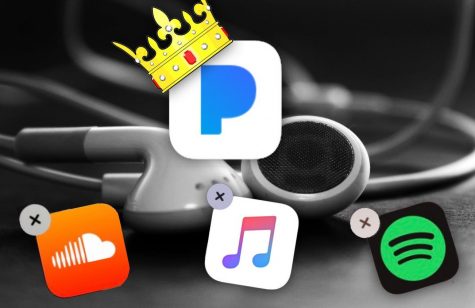FCPS needs to offer more languages at the high school level
This chart shows the number of native speakers of the major world languages. Source:Washington Post, Ulrich Ammon
January 22, 2018
The study of the French, German, Spanish, and Latin are all very important, which is why the University of Maryland completer program requires that a student must pass two levels of these language classes to graduate . Until the 21st Century, citizens of the United States regularly interacted with people from European countries because many had immigrant parents or grandparents.
In the 21st Century, we continue to be Eurocentric even though we need opportunities to learn Chinese, Russian, or Arabic. A study conducted by the language app, Babbel, reports that Chinese is the most spoken language in the world; Arabic is fifth most spoken; and Russian is the eighth most spoken.
Unfortunately, FCPS does not offer classes to learn Chinese, Russian, or Arabic. According to Madame Dragana Blonder, French teacher and head of the Language Department, the reason the schools struggle to offer more languages is because it would be difficult to gather enough interest from students to form a class. This lack of interest is why Linganore’s pilot program of Italian failed.
FCPS offers ASL (American Sign Language), but there is not a teacher at every school. If a student signs up for a class and it is not available at the student’s current school, student services will make arrangements to allow that student to take their desired class. For example, Linganore students can still take NJORTC, even though it is not offered in the building.
FCPS needs to catch up with Montgomery County and Prince George’s County and offer Russian, Arabic, and Chinese. A solution to help introduce students to languages not offered at FCPS schools is possible.The answer is simple: start a high school WLEX club, modeled after the current middle school WLEX class.
WLEX, or World Language Exploratory, is an elective being taught at every FCPS middle school. At New Market Middle School, the class is taught by Madame Jenny Burke and it explores different languages throughout the year. In this class, students have a segment on each language in their curriculum: ASL, German, Latin, French, and Spanish.
“There are so many things that about it, but the number one thing is probably that we get to have fun doing something completely different than all of the other classes in school. We get to “travel” the world and learn not only the language, but the cultures of these languages,” Burke said. “We can be creative, explore, and play games. I think WLEX is an awesome class because it allows students to try a variety of languages and make an educated decision about what language they want to pursue in their future studies.”
Burke also explains that this class is a stress-free way of learning new languages. Middle schoolers get to study these languages without the worry of benchmarks or high school credits. Learning a new language like this can spark more enthusiasm for the subject as well.
A high school WLEX club would be similar to the middle school class, but just in a smaller, condensed format. The club could meet during PREP. FCPS teachers or community members who know a language other than English could teach short lessons about their language. It would be a great way to involve community members and to give students a sneak peak into other languages besides those taught at school.
Robyn Lafferty, a community member and parent of two Linganore graduates, is fluent in ASL.
“Since ASL is a conceptually based language, I think it can be easier for some people to grasp at the beginning level. I don’t think it would be difficult to give an introduction to ASL workshop to high schoolers. I think it would be very beneficial, especially in an area with a very prominent deaf community.”
It is imperative that FCPS find a way to offer other languages than those currently offered, and a club is a perfect way to do so. In addition to teaching students important languages, increased American knowledge of languages such as Arabic, Chinese, or Russian may soothe political tensions. With a common tie to these countries, American may be less quick to judge and more prone to interact with people in these areas of the world.












Lyra- • Jan 23, 2018 at 10:06 am
I rightfully agree with the fact that FCPS (Not just FCPS, but all public schools. Let’s just start small here.) should offer more languages. Not only for the facts, and statements that you have provided, but I have another reason. For one, many jobs are looking for people who can speak multiple languages and many foreign languages that aren’t offered here. People who want to work for places like NASA, speaking Russian or Chinese can make or break the international relationships between the work force grow. For second, colleges look for people who can speak those international languages. High ranking colleges want those people,it makes the chance of that person getting into your dream college better.